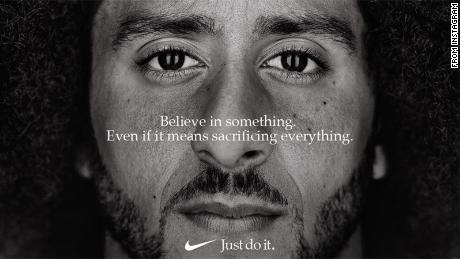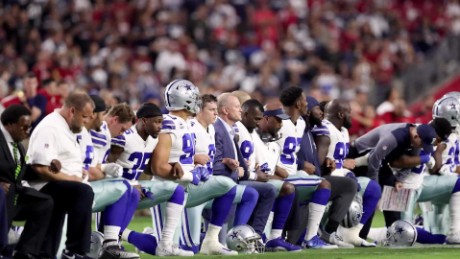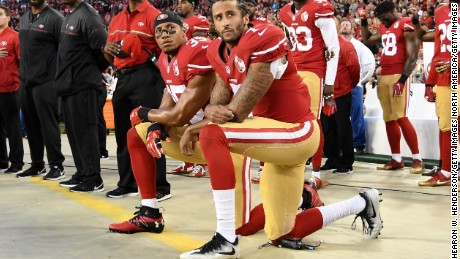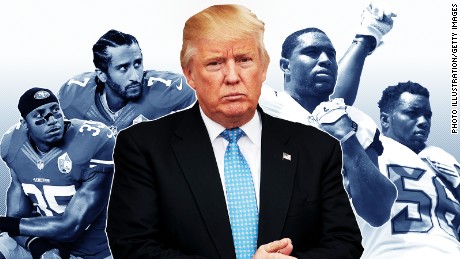A timeline of social activism in sports
In 2012 members of the Miami Heat -- led by LeBron James, Dwyane Wade and Chris Bosh -- posed in hoodies in solidarity with slain Florida teenager Trayvon Martin.
A timeline of social activism in sports
African-American athletes have a long history of speaking up in defense of civil rights. In 1967 a group of top athletes from various sports gathered to support Muhammad Ali in rejecting the draft during the Vietnam War. Seated in the front row, from left to right: Bill Russell, Ali, Jim Brown and Lew Alcindor (now Kareem Abdul-Jabbar). Standing behind them are Carl Stokes, Walter Beach, Bobby Mitchell, Sid Williams, Curtis McClinton, Willie Davis, Jim Shorter and John Wooten.
A timeline of social activism in sports
Tommie Smith (center) and John Carlos (right) of the US launched one of the most famous sporting protests in history on the podium at the 1968 Mexico Olympics with their Black Power salute. Australian sliver medalist Peter Norman (left) also stood in protest, wearing a human rights badge on his track suit. The act harmed his career in Australia.
A timeline of social activism in sports
NBA star Carmelo Anthony of the New York Knicks marched with protesters in Maryland, demanding better police accountability and racial equality following the death of Freddie Gray while in police custody in April 2015.
A timeline of social activism in sports
In 2016 Colin Kaepernick ( #7) of the San Francisco 49ers created a storm by refusing to stand for the national anthem before NFL games. He is pictured with teammate Eric Reid (#35) prior to a home game against the Los Angeles Rams on September 12, 2016.
A timeline of social activism in sports
Other athletes -- including those at the college and high school level -- joined Kaepernick's protest. Megan Rapinoe (#15) of the US Women's National Team knelt before a match against Thailand on September 15, 2016 in Columbus, Ohio.
A timeline of social activism in sports
Social protest is also something undertaken by fans. Back on December 4, 1935, the German football team give the Nazi salute at White Hart Lane, the London home of Tottenham Hotspur. England fans protested outside the stadium before the match, according to sports sociologist Joseph Maguire.
A timeline of social activism in sports
In 2009 Inter Milan fans held up posters supporting Mario Balotelli in response to racist abuse that the player received at Juventus. The English translation of the posters is "Better black than Juventus."
A timeline of social activism in sports
German footballer Deniz Naki -- shown playing for former club St. Pauli of the Bundesliga -- was banned for 12 matches and fined $5,825 for a Facebook post dedicating his Turkish second division club's victory to Kurdish combatants in southeastern Turkey. Naki's parents are of Kurdish origin, and he has Kurdish-themed tattoos on his arms.
A timeline of social activism in sports
England cricketer Steve Harrison refused to travel to Zimbabwe in 2004 for a series of matches. Although Harrison boycotted the tour for political reasons against the Zimbabwean regime, the England & Wales Cricket Board did not take any action against him.
A timeline of social activism in sports
British-Ghanian player Emmanuel Frimpong received a red card in the first match of the 2015 Russian soccer season after making an obscene gesture at Spartak Moscow. He later wrote on social media that he was responding to racial abuse from the stands. "(I) am a human being shouldn't be racially abused for the game that I love," he wrote. "And yet we going to hold a World Cup in this country where African(s) will have to come play football."
A timeline of social activism in sports
AC Milan's former Ghanaian defender Kevin-Prince Boateng picked up the ball, kicked it towards the stands and walked off the pitch during a friendly against Pro Patria in Busto Arsizio on January 3, 2013 because of racists chants from home supporters. "Shame that these things still happen," the 25-year-old German-born Ghanaian player said on his Twitter account. The match was stopped in the 26th minute when he led his team off the pitch.
A timeline of social activism in sports
Former NBA player John Amaechi, who is now a psychologist in London, says standing for national anthems before sporting events is unnecessary. He added that he would not attend a tournament in Russia if he was an active athlete.
A timeline of social activism in sports
Howard Gayle played for eight English football clubs, and was the first black player to play for Liverpool. Gayle says he tried to educate teammates on acts of passive racism. During his playing days he did not sing the national anthem, and later refused an MBE (Member of the Most Excellent Order of the British Empire) title from Buckingham Palace.














































